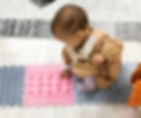

Welcome to a world where sensory play is more than just fun—it’s a key part of your baby's growth journey!
At our baby and toddler classes, sensory play is celebrated as a vibrant, essential experience that sparks joy and fosters development. From the first splash of colour to the thrill of new textures, sensory play is truly your child's favourite kind of day!
Why Sensory Play Matters
So, what is baby & toddler sensory play & why is it important? Sensory play is all about engaging your baby’s senses—touch, sight, sound, smell, and taste. This type of play is incredibly beneficial for young children as it helps with cognitive development, fine motor skills, and emotional growth. It’s a fantastic way to stimulate curiosity, encourage exploration, and build those all-important developmental skills.

What to Expect from Our Sensory Play Sessions
Textural Adventures: Discover textures that will fascinate and engage your baby. From Soft rattles, crinkly toys, and textured balls, to cool, smooth mirror balls, exploring different textures helps develop tactile senses and motor skills.
Colourful Discoveries: Bright, colourful materials capture your baby’s attention and stimulate visual development. Sensory play with vibrant colours can enhance visual tracking and recognition skills while making learning fun.
Sound Exploration: Engage your baby’s auditory senses with a range of sounds—from gentle chimes to soft musical instruments. Exploring different sounds helps improve auditory discrimination and language development.
Sensory Scarves and Fabrics: Incorporate colourful, soft sensory scarves or fabrics during tummy time. Gently place them around your baby or let them explore different textures with their hands. The movement of the scarves and the variety of textures will capture your baby’s attention and encourage sensory exploration.
Mirror Play: Place a baby-safe mirror in front of your baby. Babies love looking at their reflection, and it can encourage them to lift their head and engage with their surroundings. Mirror play also supports visual development and helps with self-recognition.
Sensory Toys: Introduce a range of sensory toys with different textures, colours, and sounds can help stimulate your baby’s senses and keep them engaged. They are great for keeping your baby interested and motivated.
Interactive Songs and Rhymes: Sing playful songs or reciting nursery rhymes. Baby loves the sound of your voice and even your singing voice too! The sound of your voice and the rhythm of the songs will engage your baby’s auditory senses, AND give them, and you, a boost of oxytocin (the happy hormone). Songs with simple, repetitive lyrics create a comforting and engaging experience for your child. 🎶
The Benefits of Sensory Play
Sensory play is more than just enjoyable—it’s a vital part of your baby’s development. Here’s the TOP benefits of sensory play:
Enhances Cognitive Development: Engaging with different sensory materials helps build neural connections in the brain, supporting cognitive skills like problem-solving and spatial awareness.
Boosts Motor Skills: Activities that involve touching, moving, and manipulating objects help develop fine and gross motor skills, preparing your baby for future physical milestones.
Supports Emotional Growth: Sensory play can be incredibly soothing and comforting for babies, helping them to relax and build emotional resilience.
Encourages Social Interaction: Group sensory play sessions offer opportunities for your baby to interact with others, fostering social skills and communication.
Nurturing Newborns with Sensory Play
You may be wondering when to start baby sensory play with your little one.
Well...every moment can be an opportunity to nurture your newborn's development! Sensory activities are perfect for stimulating your baby's senses—sight, sound, touch, and more. For newborns start small, with soothing textures or calming sounds. Keep it to simple interactions like gentle touch, soft music, and high-contrast visuals. These simple activities can make a big difference in your baby's cognitive and emotional growth. Early sensory experiences help build neural connections, fostering curiosity and comfort in their new world of discovery during the 4th trimester.
Understanding and Managing Baby Sensory Overload
Sensory overload can happen when a baby is exposed to too many stimuli at once, leading to fussiness, crying, or signs of distress. Newborns and premature babies can get overwhelmed quickly if there is a lot of constant stimuli.
Recognising the signs: Your baby may show they are becoming overwhelmed by actions like turning away, rubbing eyes, or becoming unusually quiet, they may fall asleep.
If your baby seems overwhelmed, try reducing the stimulation you can do this in class by putting down the toys for a while, holding your baby in a soothing hold, or stepping out the class for a moment.
At home during play if you notice they are showing signs of overload you can take actions like dimming the lights, gentle rocking, lowering noise levels, or moving to a quieter space. Remember, every baby has different sensory thresholds, so it’s okay to adjust the pace and intensity of sensory play to suit your baby’s comfort.
Engaging Toddlers with Sensory Play 🎨✨
Sensory play for toddlers is a fantastic way to fuel your child's curiosity and development. At this stage, your little one is eager to explore the world through touch, sight, sound, and movement. Activities like playing with textured toys, exploring different scents, and splashing in water stimulate their senses and promote fine motor skills. Sensory play also enhances cognitive growth by encouraging problem-solving and creativity. Whether it's squishing food, listening to new sounds, or feeling different materials, these experiences help your toddler learn and grow in a fun, hands-on way. Messy Play Fun: Embrace the messiness of play! Whether it’s finger painting or playing with water, messy play activities are not only exciting but also great for developing creativity and fine motor skills. It’s all about letting your baby experience the joy of exploration and self-expression.
What to Do When Your Baby Doesn’t Like Sensory Play
It's okay if your baby isn't a fan of sensory play just yet—every little one is different! Some babies take time to warm up to new experiences, and that's perfectly normal. Start with gentle, low-key activities like soft textures or calming sounds. You can try holding your baby while introducing new sensations or engaging in sensory play together to make them feel more secure. Remember, it’s all about creating a comforting environment. Be patient, and let your baby explore at their own pace. Over time you will recognise the play activities they like to engage in as they grow to enjoy sensory play in their own unique way.
Join the Fun
Every day is a sensory adventure in our classes, and it’s a joy to see the excitement on your baby’s face as they explore and discover. If you’re ready to dive into a world of textures, colours, and sounds, join us at a class near you and make sensory play a part of your baby’s day!















